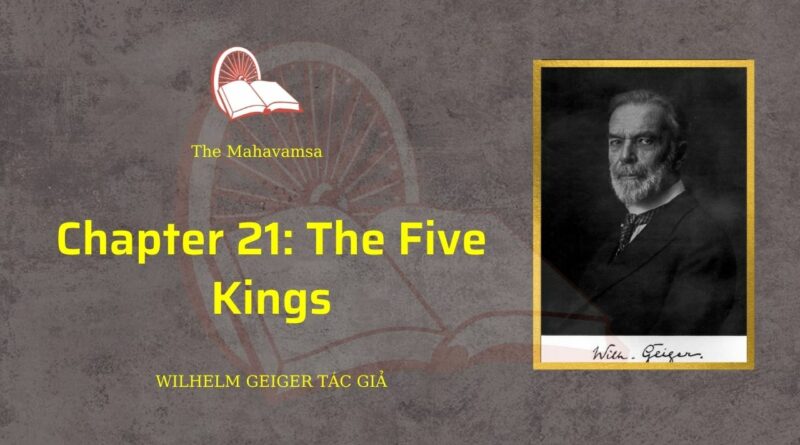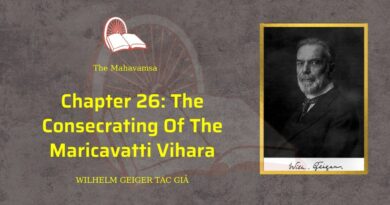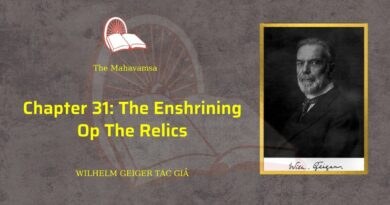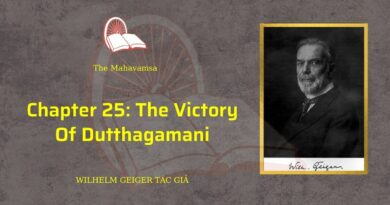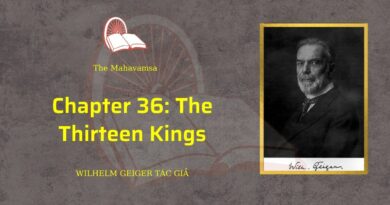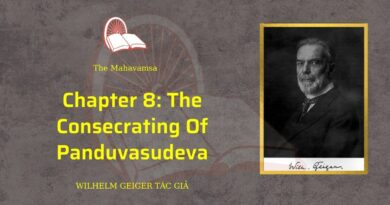THE MAHAVAMSA – CHAPTER 21: THE FIVE KINGS
UTTIYA’s younger brother, MAHASIVA, reigned after his death ten years, protecting the pious. Being devoted to the thera Bhaddasäla, he built the noble vihara, Nagarangana, in the eastern quarter (of the city).
Mahäsiva’s younger brother, SURATISSA, reigned after his death ten years, zealously mindful of meritorious works. In the southern quarter (of the city) he founded the Nagarangana-vihara, in the eastern quarter the vibära (called) Hatthikkhandha and the Gonnagirika (vihara) on the Vangutrara-mountain the (vihära) named Pacinapabbata and near Raheraka the (vihära) Kolambahalaka; at the foot of the Arittha(mountain) the Makulaka(vihära), to the east the Acchagallaka(vihara), but the Girinelavahanaka(vihara) to the north of Kandanagara; these and other pleasing viharas, in number five hundred, did the lord of the earth build on this and the further bank of the river, here and there in the island of Lanka, before and while he reigned, during the period of sixty years, piously and justly, devoted to the three gems. Suvannapindatissa was his name before his reign, but he was named Süratissa after the beginning of the reign.
Two Damilas, SENA and GUTTIKA, sons of a freighter who brought horses hither,’ conquered the king Süratissa, at the head of a great army and reigned both (together) twenty-two years justly. But when ASELA had overpowered them, the son of Mutasiva, the ninth among his brothers, born of the same mother, he ruled for ten years onward from that time in Anuradhapura
A Damila of noble descent, named ELARA, who came hither from the Chola-country to seize on the kingdom, ruled when he had overpowered king ASELA, forty-four years, with even justice toward friend and foe, on occasions of disputes at law.
At the head of his bed he had a bell hung up with a long rope so that those who desired a judgement at law might ring it. The king had only one son and one daughter. When once the son of the ruler was going in a car to the Tissa-tank, he killed unintentionally a young calf lying on the road with the mother cow, by driving the wheel over its neck. The cow came and dragged at the bell in bitterness of heart; and the king caused his son’s head to be severed (from his body) with that same wheel.
A snake had devoured the young of a bird upon a palmtree. The hen-bird, mother of the young one, came and rang the bell. The king caused the snake to be brought to him, and when its body had been cut open and the young bird taken out of it he caused it to be hung up upon the tree.
When the king, who was a protector of tradition, albeit he knew not the peerless virtues of the most precious of the three gems, was going (once) to the Cetiya-mountain to invite the brotherhood of bhikkhus, he caused, as he arrived upon a car, with the point of the yoke on the waggon, an injury to the thüpa of the Conqueror at a (certain) spot. The ministers said to him: ‘King, the thüpa has been injured by thee.’ Though this had come to pass without his intending it, yet the king leaped from his car and flung himself down upon the road with the words: ‘Sever my head also (from the trunk) with the wheel.’ They answered him: ‘Injury to another does our Master in no wise allow; make thy peace (with the bhikkhus) by restoring the thupa’; and in order to place (anew) the fifteen stones that had been broken off he spent just fifteen thousand kahapanas.
An old woman had spread out some rice to dry it in the sun. The heavens, pouring down rain at an unwonted season, made her rice damp. She took the rice and went and dragged at the bell. When he heard about the rain at an unwonted season he dismissed the woman, and in order to decide her cause he underwent a fast, thinking: ‘A king who observes justice surely obtains rain in due season.’ The guardian genius who received offerings from him, overpowered by the fiery heat of (the penances of) the king, went and told the four great kings of this (matter). They took him with them and went and told Sakka. Sakka summoned Pajjunna and charged him (to send) rain in due season. The guardian genius who received his offerings told the king. From thenceforth the heavens rained no more during the day throughout his realm; only by night did the heavens give rain once every week, in the middle watch of the night; and even the little cisterns everywhere were full (of water).
Only because he freed himself from the guilt of walking in the path of evil did this (monarch), though he had not put aside false beliefs, gain such miraculous power; how should not then an understanding man, established in pure belief, renounce here the guilt of walking in the path of evil?

